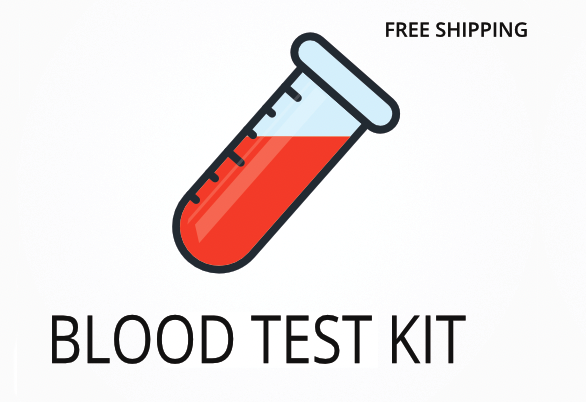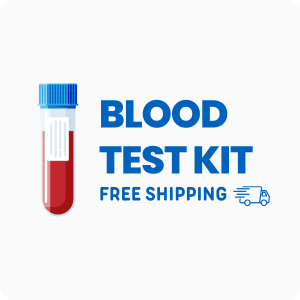Ordering the IgE Food Allergy Basic Test (25) | Great Plains
The IgE Food Allergy Basic Test (25) from Great Plains helps identify specific food allergies by measuring IgE antibodies in your blood. This test is useful for pinpointing foods that may be causing symptoms like rashes, stomach pain, or breathing issues. Interestingly, some people with food allergies may not have immediate symptoms, making it harder to connect certain foods to their reactions.
Ordering this test can help you:
- Find out which foods are causing allergic reactions
- Reduce symptoms like hives, itching, or swelling by avoiding trigger foods
- Support your doctor in creating a targeted allergy management plan
- Track changes in your food allergies over time
- Identify hidden food allergies that may not cause obvious symptoms
Who Should Consider Food Allergy Screening
People who have ongoing issues like skin rashes, stomach pain, or trouble breathing after eating certain foods may benefit from this test. For example, someone who often gets headaches or stomach cramps after meals but cannot figure out which food is causing the problem could use this test to find answers.
Ordering this test may also be helpful if you:
- Have eczema or unexplained skin irritation that flares up after eating
- Experience frequent sinus congestion or sneezing after meals
- Deal with digestive problems like bloating, diarrhea, or nausea
- Notice fatigue or trouble focusing after eating certain foods
- Have a family member with food allergies and want to check your own risk
Pinpointing food allergies can help you avoid foods that trigger symptoms, leading to fewer allergic reactions and less time spent feeling unwell. Delaying this test could mean more time spent guessing which foods are safe, possibly leading to more uncomfortable or unexpected reactions.
Preparing for Allergy Antibody Testing
Fasting is not required for this test, but always check the test kit instructions for any special steps before your blood draw. Make sure to follow any directions your doctor or healthcare provider gives you, as these can help ensure your sample is collected correctly and your results are as useful as possible.
Labs Included When Ordering Your IgE Food Allergy Basic Test (25) | Great Plains
| Test Name | Reference Range | What It Means | High Levels |
|---|---|---|---|
| Almond IgE | <0.35 | Measures allergic response to almonds. High levels may indicate an almond allergy, which can cause skin, digestive, or breathing symptoms. | High levels of Almond IgE suggest a possible almond allergy and risk of allergic reactions after eating almonds. |
| Brazil Nut IgE | <0.35 | Checks for allergy to Brazil nuts. This can help you avoid foods that may cause reactions like swelling or itching. | High levels of Brazil Nut IgE mean you may react to Brazil nuts and should avoid them. |
| Cashew Nut IgE | <0.35 | Detects allergic response to cashews. Cashew allergies can cause symptoms ranging from mild itching to more severe reactions. | High levels of Cashew Nut IgE show a risk for allergic reactions to cashews. |
| Egg White IgE | <0.35 | Measures allergy to egg whites. This is common in children and can cause skin, stomach, or breathing problems. | High levels of Egg White IgE mean you may have an egg white allergy. |
| Hazelnut IgE | <0.35 | Checks for hazelnut allergy, which can cause symptoms like hives, swelling, or stomach pain. | High levels of Hazelnut IgE suggest a hazelnut allergy. |
| Peanut IgE | <0.35 | Detects peanut allergy, which can cause severe reactions. This test helps you know if you need to avoid peanuts. | High levels of Peanut IgE mean you may have a peanut allergy and should avoid peanuts. |
| Pecan Nut IgE | <0.35 | Measures allergy to pecans. This can help you avoid foods that may cause allergic reactions. | High levels of Pecan Nut IgE show a risk for pecan allergy. |
| Pistachio Nut IgE | <0.35 | Checks for pistachio allergy, which can cause symptoms like itching, swelling, or stomach upset. | High levels of Pistachio Nut IgE suggest a pistachio allergy. |
| Walnut IgE | <0.35 | Detects walnut allergy, which can cause skin, stomach, or breathing symptoms. | High levels of Walnut IgE mean you may react to walnuts. |
| Cow’s Milk IgE | <0.35 | Measures allergy to cow’s milk, which can cause stomach pain, rashes, or breathing problems. | High levels of Cow’s Milk IgE suggest a milk allergy. |
| Wheat IgE | <0.35 | Checks for wheat allergy, which can cause skin, stomach, or breathing symptoms after eating wheat products. | High levels of Wheat IgE mean you may have a wheat allergy. |
| Soybean IgE | <0.35 | Detects allergy to soybeans, which can cause symptoms like hives, stomach pain, or trouble breathing. | High levels of Soybean IgE suggest a soybean allergy. |
| Sesame Seed IgE | <0.35 | Measures allergy to sesame seeds, which can cause skin or stomach symptoms. | High levels of Sesame Seed IgE mean you may react to sesame seeds. |
| Codfish IgE | <0.35 | Checks for codfish allergy, which can cause skin, stomach, or breathing symptoms after eating fish. | High levels of Codfish IgE suggest a codfish allergy. |
| Crab IgE | <0.35 | Detects allergy to crab, which can cause hives, swelling, or trouble breathing. | High levels of Crab IgE mean you may react to crab. |
| Lobster IgE | <0.35 | Measures allergy to lobster, which can cause skin or breathing symptoms. | High levels of Lobster IgE suggest a lobster allergy. |
| Shrimp IgE | <0.35 | Checks for shrimp allergy, which can cause hives, swelling, or stomach pain. | High levels of Shrimp IgE mean you may react to shrimp. |
| Salmon IgE | <0.35 | Detects allergy to salmon, which can cause skin, stomach, or breathing symptoms. | High levels of Salmon IgE suggest a salmon allergy. |
| Tuna IgE | <0.35 | Measures allergy to tuna, which can cause hives, swelling, or stomach pain. | High levels of Tuna IgE mean you may react to tuna. |
| Chicken IgE | <0.35 | Checks for chicken allergy, which is rare but can cause skin or stomach symptoms. | High levels of Chicken IgE suggest a chicken allergy. |
| Beef IgE | <0.35 | Detects allergy to beef, which can cause skin, stomach, or breathing symptoms. | High levels of Beef IgE mean you may react to beef. |
| Corn IgE | <0.35 | Measures allergy to corn, which can cause skin or stomach symptoms. | High levels of Corn IgE suggest a corn allergy. |
| Oat IgE | <0.35 | Checks for oat allergy, which can cause skin, stomach, or breathing symptoms. | High levels of Oat IgE mean you may react to oats. |
| Rice IgE | <0.35 | Detects allergy to rice, which can cause skin or stomach symptoms. | High levels of Rice IgE suggest a rice allergy. |
| Barley IgE | <0.35 | Measures allergy to barley, which can cause skin, stomach, or breathing symptoms. | High levels of Barley IgE mean you may react to barley. |
| Rye IgE | <0.35 | Checks for rye allergy, which can cause skin, stomach, or breathing symptoms. | High levels of Rye IgE suggest a rye allergy. |
Reference ranges may change slightly as labs update their testing methods or guidelines.
IgE Food Allergy Basic Test (25) | Great Plains FAQ
Is there IgE Food Allergy Basic Test (25) | Great Plains testing near me?
This test is a kit that can be collected at a local draw site; check the draw location link at the top of the page. For people who experience symptoms like rashes or stomach pain after eating, having a nearby collection site makes it easier to get tested quickly and start finding answers.
How do I interpret the test results?
While your treating physician should review your results, you can also use our one-on-one test results review service for a detailed explanation from our clinical team.
What is the cost of the test?
The price listed for this test includes standard shipping to you and return shipping to the lab, but draw fees may apply. Ordering this test can help you quickly identify food triggers, which may help you feel better sooner.
How often should I retest?
Retesting is usually recommended every 12-24 months, especially if your symptoms change or you start a new treatment plan. Regular testing helps you keep track of any new or changing food allergies.
How accurate is the test?
This test uses an enzyme-linked immunosorbent assay (ELISA) method to measure IgE antibodies to specific foods, with a specificity of 98% and sensitivity of 97%. TrueHealthLabs.com partners with CLIA-certified and CAP-certified laboratories to uphold rigorous testing standards for dependable results.
Important Notes
- This test can not be collected or mailed from New York State. Contact us with questions.
Medical Review Board
Reviewed by Jeff Donohue M.D. from Body Logic and Brady Hurst DC, CCCN. Written by True Health Lab’s team of editorial health contributors.
Disclaimer: This information is for educational purposes only and not intended as medical advice. Consult your healthcare provider for personalized guidance.
Why Customers Trust True Health Labs - What People are saying
Also rated 4.6 out of 5 based on 3452 ShopperApproved reviews- See all TrueHealthLabs.com reviews.








